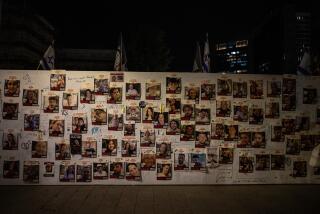Let Military Panels Punish Terrorists
- Share via
The prime objective in war should be the defeat of the enemy on the field of battle. But what if terrorist operatives are captured instead of killed? What if the good offices of our newfound friends the Pakistanis result in the delivery to our custody of Osama bin Laden himself? Must we spend millions of dollars and months for pretrial hearings, mega-trials endless appeals as we furnish him the panoply of constitutional safeguards afforded ordinary defendants in our civilian system of criminal justice?
The acts at issue here are far graver than acts of war. These have been acts of horrific violence directed deliberately and with premeditation, toward civilians and noncombatants. Under the law of nations, such acts in war are “crimes against humanity.” Further, directing attacks against military targets, like the destroyer Cole or the Pentagon, does not save the terrorist from being branded as a war criminal. According to Supreme Court precedent, enemies who wear no uniforms, hide their weapons from view and act as saboteurs are illegal combatants who may be executed as if they were spies rather than treated as prisoners of war.
When apprehended, such enemy infiltrators waging illegal war are not to be tried in the civilian courts, but before a military commission. This is neither an international tribunal based on the Nuremberg model nor a court-martial as in a nation’s own armed forces, but rather a court composed of military officers designated to try and punish enemy combatants who are violating the laws of war. Such courts were used during and after World War II for Nazi saboteurs who landed on our eastern shore and in the trial of Gen. Tomoyuki Yamashita, who presided over Japanese soldiers’ savage atrocities in the Philippines against civilians and prisoners of war. None of these offenders was able to avoid execution by appealing that he was denied the right to a civilian jury trial and the full due process protections of the civilian system of justice.
The military commission approach to bringing captured terrorists “to justice” presents distinct advantages. Unlike the war-crime tribunals in Europe for Balkan war atrocities, military commissions may apply the death penalty. Moreover, terrorist war criminals caught before they are able to commit mass murder--not just the successful ones--may be executed. This is significant, considering that the recent gang of terrorists committed suicide as part of their scheme. For them, there clearly was no moral difference between the plot and the completed act. Accordingly, the captured terrorist should not find refuge in an artificial distinction.
Obviously the death penalty is no deterrent to people who believe that dying for their cause is martyrdom. But there are practical reasons for wanting swift and sure death sentences for terrorist war criminals. Before the recent plane hijackings, the history of modern terrorism was replete with examples of terrorists commandeering airplanes and ships. The objective of those terrorists was to hold hostages to exchange for the release of imprisoned comrades. If the imprisoned comrades have been executed, the value of taking hostages is diminished.
In the terrorism context, the whole question about the legality of assassination under an old executive order is a red herring. Now that we are engaged in at least the constitutional equivalent of a declared war, neutralizing the command and control structure of the enemy forces, including specific enemy personnel, is entirely legitimate. Should we not have specifically targeted and shot down Adm. Isoroku Yamamoto’s plane during World War II? Should we not have assassinated Adolf Hitler, had the opportunity presented itself?
Another advantage of the military system would be the opportunity for a proper military interrogation of the suspects. Do we want to give an arrested terrorist suspect, who could have the information to save the next 5,000 innocent lives, the Miranda warning to clam up and lawyer up?
Finally, the military commission would bypass the obstacle course of evidentiary rules that bogs down many criminal prosecutions. It would favor the admission of evidence instead of the exclusion based on how that evidence was obtained. Tapes of the cell phone calls of the doomed aboard the airliners, for example, would probably be admitted rather than possibly excluded as hearsay.
The military commission approach would err more on the side of protecting national security rather than the side of freeing the guilty to achieve absolute fairness in the process. Some will contend that this would institutionalize a transgression of civil liberties that, in effect, “lets the terrorist win” by depriving people of basic rights.
Such rhetoric misstates the law. The suspects we are talking about are foreign enemy agents, apprehended amid a declared state of war.
To afford such individuals, at the risk of our citizens’ safety, the same due process applied to criminal defendants in the civilian justice system, is to extend to them rights that they do not have.
More to Read
Sign up for Essential California
The most important California stories and recommendations in your inbox every morning.
You may occasionally receive promotional content from the Los Angeles Times.










